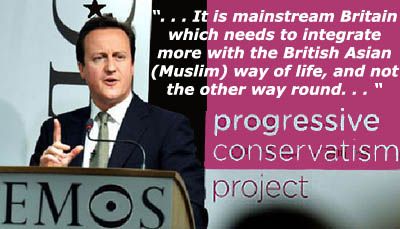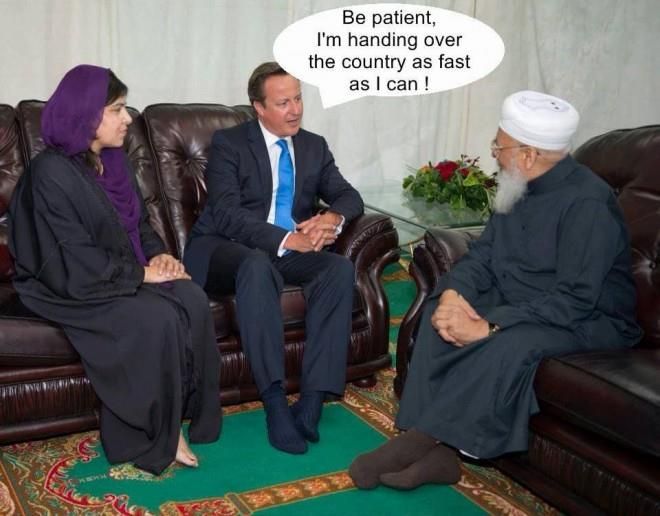"I want London to stand alongside Dubai and Kuala Lumpur as one of the great capitals of Islamic finance anywhere in the world." — David Cameron, Prime Minister, Great Britain.
But critics say that British ambitions to attract investments from Muslim countries, companies and individuals are spurring the gradual establishment of a parallel financial system based on Islamic Sharia law. The Treasury also said some sukuk Islamic bond issues may require the government to restrict its dealings with Israeli-owned companies in order to attract Muslim money.
The London Stock Exchange will be launching a new Islamic bond index in an effort to establish the City of London as one of the world's leading centers of Islamic finance.
Britain also plans to become the first non-Muslim country to issue sovereign Islamic bonds, known as sukuk, beginning as early as 2014.
The plans are all part of the British government's strategy to acquire as big a slice as possible of the fast-growing global market of Islamic finance, which operates according to Islamic Sharia law and is growing 50% faster than the conventional banking sector.
Although it is still a fraction of the global investment market -- Sharia-compliant assets are estimated to make up only around 1% of the world's financial assets -- Islamic finance is expected to be worth £1.3 trillion (€1.5 trillion; $2 trillion) by 2014, a 150% increase from its value in 2006, according to the World Islamic Banking Competitiveness Report 2012-2013, published in May 2013 by the consultancy Ernst & Young.
But critics say that Britain's ambitions to attract investments from Muslim countries, companies and individuals are spurring the gradual establishment of a parallel global financial system based on Islamic Sharia law.
British Prime Minister David Cameron announced the plans during a keynote speech at the ninth World Islamic Economic Forum, which was held in London from October 29-31, the first time the event has ever been held outside the Muslim world.
"Already London is the biggest center for Islamic finance outside the Islamic world," Cameron told the audience of more than 1,800 international political and business leaders from over 115 countries.
"And today our ambition is to go further still. Because I don't just want London to be a great capital of Islamic finance in the Western world, I want London to stand alongside Dubai and Kuala Lumpur as one of the great capitals of Islamic finance anywhere in the world."
David Cameron, this blunt IDIOT and sorry excuse for a PM, obviously is incapable of acknowledging that the muslim world is underperforming dramatically economically. Muslim financing methods are sluggish and totally inefficient. By contrast, western financing methods are the unquestionable engine behind the world's economic growth, as they have been copied by basically all other (non-muslim) countries, even China. Genuine drawbacks like crashes in the stock market are in se not unavoidable, as they are often the result of government intervention (read harmful legislation) and when not, their effects are relatively well digested IF, again, government(s) do not interfere.
By contrast, what have islamic financing methods ever produced apart from high-profile infrastructure projects that are basically the result of oil wealth? The following exerpt offers a sobering diagnosis of islam's inability to foster sound economic systems:
"The evidence of dismal economic condition in Muslim world, compared to the other regions of the globe, is obviously staggering. Even a scant examination of the key economic indicators in prominent Muslim countries reveals abysmal results. I put together a table showing the values of a few such indicators for 17 prominent Muslim countries and carefully examined and compared and contrasted them with those for the industrialized nations. These 17 countries all have a population of more than ten millions, at least 88% of which is Muslim. The findings may be appalling but not totally new or surprising. With the exception of Turkey and a couple of oil-rich counties, namely Iran and Saudi Arabia, almost all the other Muslim countries I looked into have a per capita income level of less than $5,000, in most cases even less than $2,000. To put this in perspective, the per capita income for United States is around $47,000, which is currently ranked number seven in the world. The share of population living below poverty line (defined as the annual income of nearly $20,000 for a family of four according to the US Census Bureau) is another telling statistics. This rate in key Muslim countries ranges from 12% in Syria to as high as 63% in Niger, 53% in Afghanistan, and 45% for both Yemen and Bangladesh. This rate is about 18% for Iran.
One can surmise that the percentage of population living below poverty line should be very low for a rich country like the US or really high for the poor nations. Well, it is not necessarily so. This rate, for example, is currently about 13% for the US simply because income distribution is fairly inequitable in this country and the rich and poor gap has been widening during the last three decades. On the contrary, for a poor country with low per capita income, like Syria, the same rate is relatively low, 12%. This is either due to reasonably even distribution of income or because of statistical inaccuracies.
Often, economists use the combined rates of unemployment and inflation for specific year, known as the misery index, to gauge the extent of economic well being for a country or for international comparison. The lower is this index, the better is economic condition. Rising index, on the other hand, signifies economic stagnation. The misery index of more than 10% is considered unacceptable for the United States. For the past 15 years, the misery index has been around 9% for the U. S. economy in average despite the gloomy economic condition in recent years, thanks to very low rate of inflation. The misery index for the major Muslim countries ranges from 57% for Afghanistan, 58% for Iraq, 46% for Yemen, and 17% for morocco. This rate stands at 27% for Iran. One must also be mindful that all economic statistics in these are published exclusively by government and are subject to manipulation and window dressing.
Lagging behind industrialized nations in production of manufactured products and services, many Muslim countries mainly rely on export of oil, raw materials, and basic agricultural products as the primary source of revenues. The total value of exports of the selected Muslim countries is nearly $708 billion a year including the vast amount of money from oil exports. This number is about 50% of the value of the China’s total exports, and is less than the total value of annual exports by Japan. There is evidently no feasible way to calculate the value of the non-oil exports for all the oil-exporting Muslim countries in my sample because they do not publish any relevant reliable data. However, according to a research conducted by some Arab scholars, the total value of non-oil exports by the entire Arab countries is less than the value of exports by the tiny country of Finland!"
But if you though that Britain's flirt with economic disaster was "all", forget about it. It goes further than that:
"In 2012, the British government began offering Muslim workers a Sharia-compliant pension fund in the public sector. A new government agency, the National Employment Savings Trust (NEST), will give Muslims who do not already have a company pension the option of investing in the HSBC Life Amanah Pension Fund, a Sharia-compliant pension scheme. The initial target market comprises some 200,000 Muslims in Britain.
In June 2011, Pointon York, an independent financial services company based in Leicestershire in central England, announced that it will begin offering four Sharia-compliant Self-Invested Personal Pensions (SIPP) products that comply with Islamic law.
Pointon York was the first specialist SIPP provider to receive Sharia-compliant accreditation by the Islamic Bank of Britain (IBB), which has pioneered Islamic retail banking in the United Kingdom. The IBB will supervise the entire life-cycle of Pointon York's pension funds to ensure full compliance with Sharia legal principles.
Muslim families in Britain can already acquire Sharia-compliant baby bonds under the British government's Child Trust Fund scheme. In 2008, Britain's Financial Services Authority (FSA) authorized the establishment of the country's first Islamic insurance company as well as the country's first Sharia MasterCard, called the Cordoba Gold MasterCard.
In addition, takaful, a type of Islamic insurance, reached a new high in 2012, with premiums estimated to have reached around $30 billion, according to The City UK, the financial services lobby group.
PM Cameron told the economic forum that Britain has also taken steps to ensure that Muslims are not discriminated against by implementing measures ending "double taxation" on Islamic mortgages and introducing alternative forms of student and start-up loans to comply with a ban on interest payments. "Never again should a Muslim in Britain feel unable to go to university because they cannot get a student loan simply because of their religion," he said.
But some are saying that Britain should go even farther in aligning its financial system with Sharia law. In an interview with the newspaper London24, Jodie Ginsberg of Demos Finance, a financial services research firm, said: "David Cameron is right to throw Britain's doors open to the Muslim world to showcase our trading wares. But we should also use this forum as an opportunity to consider how the principles of Islamic finance itself, not just the money generated in the Muslim world, might be applied in the UK. Islamic finance is one of the few models successfully to have weathered the 2008 credit crunch and its aftermath."

Absolute lunacy.
MFBB.


No comments:
Post a Comment